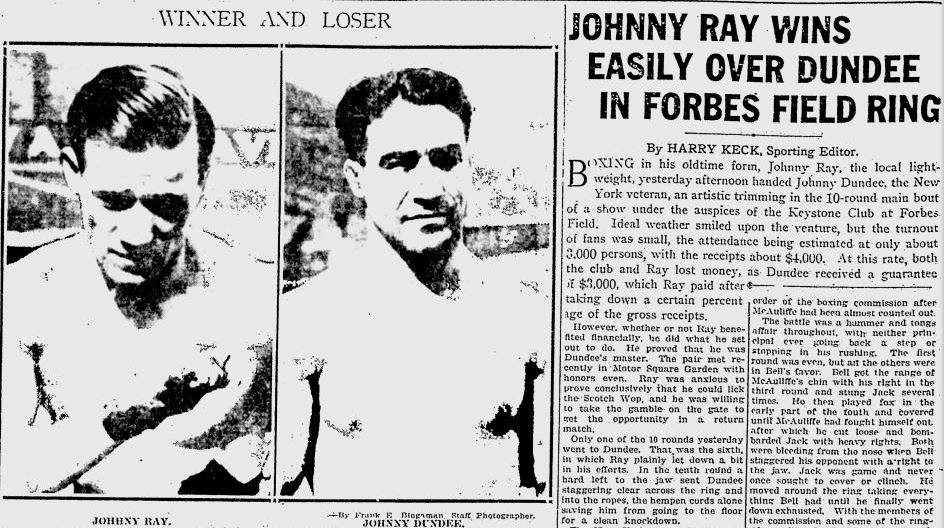Johnny Ray vs Johnny Dundee (lost radio coverage of boxing match; 1921)
On 11th April 1921, professional boxers Johnny Ray and Johnny Dundee competed at the Motor City Garden in Pittsburgh. In a ten-round fight ending in a no decision, the encounter was the first boxing match to receive live ringside radio coverage, in addition to being declared as the earliest ever live sporting event broadcast on radio.
Background
Heading into the bout, Johnny Ray had been competing in boxing since 1913.[1][2] Residing in Pittsburgh, Pennsylvania, his last bout was a "newspaper decision" win on 31st March 1921 against Eddie Carver.[1] Meanwhile, Johnny Dundee started his career in 1910; nicknamed the "Little Bar of Iron", he fought primarily within the featherweight, junior lightweight, and lightweight divisions.[3][2] He was experiencing a five-match winless streak, his last fight being a loss on points to Willie Jackson on 25th February 1921.[3] The match was billed as a 10-round no decision lightweight contest.[2][1][3]
Meanwhile, on 27th October 1920, Pittsburgh radio station KDKA was launched, becoming the first ever non-experimental commercially licenced radio station.[4][5][6] Not long into its operation, the station became interested in covering live sporting events.[4][5][2] A month prior to KDKA's launch, Detroit News' 8XK broke new ground by providing radio coverage in the form of "fight returns" for the Jack Dempsey-Billy Miske fight on 6th September 1920.[7] However, it was not declared an official broadcast of a live sporting event, especially as 8XK did not provide a ringside announcer.[7] KDKA would achieve this step forward in live radio sports coverage, when it had Pittsburgh Daily Post sports editor Florent Gibson provide play-by-play commentary during the Ray-Dundee fight on 11th April 1921 at the Motor City Garden.[8][4][2][5][6] Ultimately, the match ended in a no decision draw after all ten rounds expired.[2][1][3] Despite this, the Pittsburgh Daily Post deemed Ray to have been the better boxer on the day, stating he fought "like a master".[4]
A report by the Associated Press noted the broadcast's revolutionary nature, stating listeners could properly hear all the action from the match, including "the sounds of the conflict, the clang of the gong and the shouts of the fans."[4] KDKA's broadcast is listed as the first instance of a sporting event receiving live radio coverage, beating out the first radio broadcast of an MLB game, featuring Pittsburgh Pirates vs Philadelphia Phillies on 5th August 1921.[8][4][2][6] Boxing coverage would be enhanced still further, when a radio play-by-play occurred during Dempsey's defence of his World Heavyweight Championship against Georges Carpentier on 2nd July 1921.[4][5] Ray and Dundee would actually face each other again a month later on 21st May 1921, with Ray winning via a newspaper decision by The Pittsburgh Post.[2][1][3] Ray would continue boxing until retiring in January 1928, having competed in 138 bouts.[1][2] Meanwhile, Dundee became the first ever World Junior Lightweight Champion by beating George KO Chaney on 18th November 1921, and he would later capture the World Featherweight Championship as well.[3] He retired in 1932 after 334 bouts.[3][2]
Availability
The radio coverage of the Ray-Dundee bout occurred in an era where radio recordings were almost non-existent.[9][10][11] The only possible means of recording radio sound were through acetate or lacquer discs, but these were extremely impractical to utilise in sporting events commonly held outside radio studios.[9] The earliest surviving radio recording is claimed to have been a President Warren Harding speech on 24th May 1922, with the National Archives deeming Woodrow Wilson's Armistice Day Speech in 1923 as the first surviving regular airing.[10][11] Regardless, this makes all radio broadcasts beforehand, including the Ray-Dundee bout coverage, as most likely permanently lost.[9][10][11][2]
See Also
- Corbett and Courtney Before the Kinetograph (partially found early boxing film; 1894)
- Heavyweight Champ (lost SEGA arcade boxing game; 1976)
- Jack Dempsey vs Billy Miske (lost radio report of boxing match; 1920)
- Leonard-Cushing Fight (partially found early boxing film; 1894)
- Rocky (lost deleted scenes of boxing drama film; 1976)
- Uncle Slam and Uncle Slam Vice Squad (lost iOS presidential boxing games; 2011)
References
- ↑ 1.0 1.1 1.2 1.3 1.4 1.5 BoxRec detailing Ray's matches. Retrieved 15th Dec '22
- ↑ 2.00 2.01 2.02 2.03 2.04 2.05 2.06 2.07 2.08 2.09 2.10 Dispatches from the LP-OP summarising the match, the broadcast, and the careers of both boxers. Retrieved 15th Dec '22
- ↑ 3.0 3.1 3.2 3.3 3.4 3.5 3.6 BoxRec detailing Dundee's matches. Retrieved 15th Dec '22
- ↑ 4.0 4.1 4.2 4.3 4.4 4.5 4.6 History summarising the broadcast and declaring it as the "First live sporting event broadcast on radio". Retrieved 15th Dec '22
- ↑ 5.0 5.1 5.2 5.3 Money Games summarising KDKA's launch and broadcast, and the subsequent Dempsey-Carpentier broadcast. Retrieved 15th Dec '22
- ↑ 6.0 6.1 6.2 Sport and Dev summarising KDKA's broadcast of the event. Retrieved 15th Dec '22
- ↑ 7.0 7.1 Southwest Michigan Directory detailing the Dempsey-Miske "fight returns" broadcast. Retrieved 15th Dec '22
- ↑ 8.0 8.1 Britannica listing some of the earliest radio broadcasts of sporting events. Retrieved 15th Dec '22
- ↑ 9.0 9.1 9.2 Ngā Taonga noting most early-1920s airings were never recorded. Retrieved 15th Dec '22
- ↑ 10.0 10.1 10.2 Benjamin S. Beck detailing various examples claiming to be the earliest surviving radio broadcast. Retrieved 15th Dec '22
- ↑ 11.0 11.1 11.2 National Archives stating the oldest surviving radio broadcast is Woodrow Wilson's Armistice Day Speech from 1923. Retrieved 15th Dec '22
